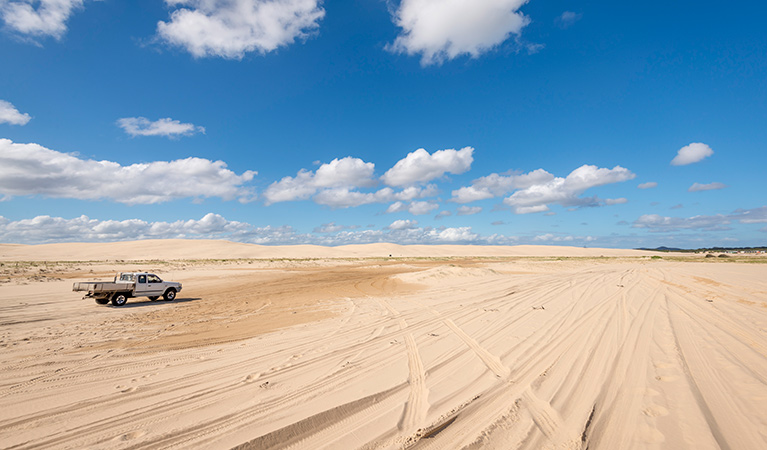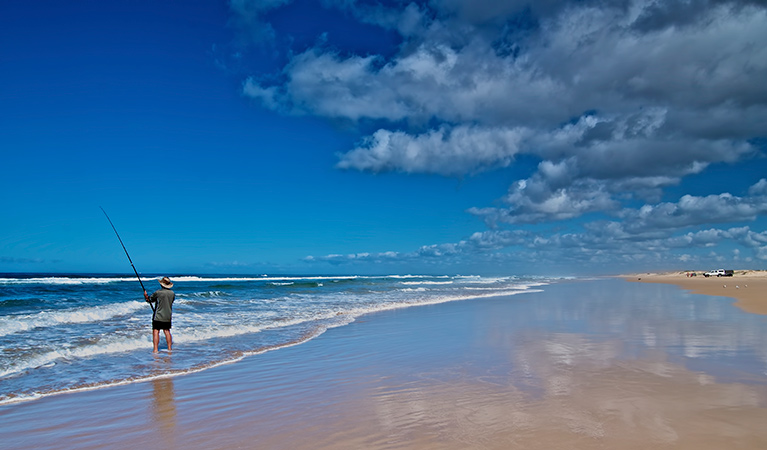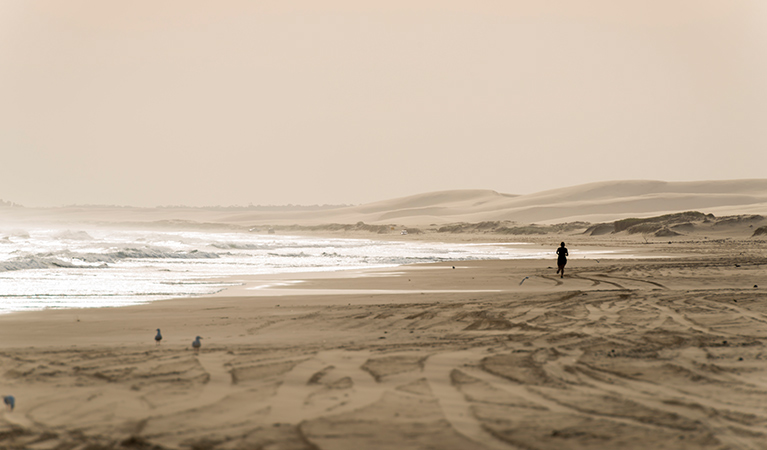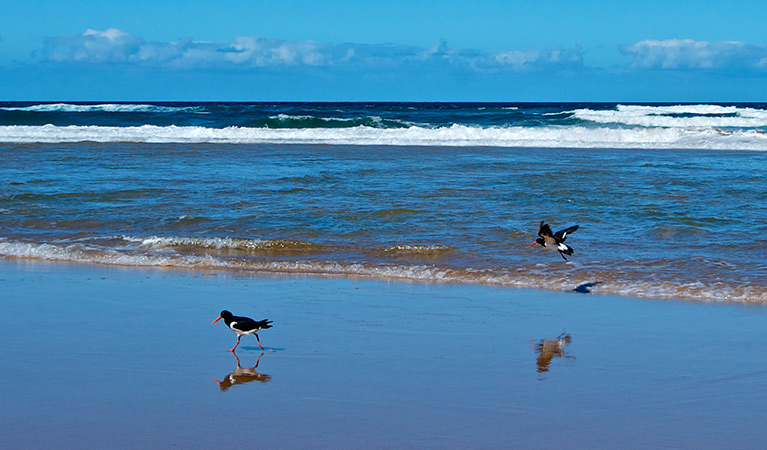Worimi National Park
Learn more
Learn more about why this park is special
Worimi National Park is a special place. Here are just some of the reasons why:
Dynamic dunes

Set your sights on the southern hemisphere's largest mobile coastal sand mass at Stockton Bight. The landscape's creation began well over 100,000 years ago, and believe it or not, these enormous dunes are 'alive' and forever changing. Stockton itself at 32km is the state's longest beach, and its dunes offer endless appeal. Their shape, slope and stability vary with the weather. This unpredictability, potential for damage to Aboriginal cultural sites, and possible impacts to plants and animals are important reasons why we ask you not to drive over the dunes.
- Quad Bike King tours in Worimi sand dunes Jump onto your very own 4WD quad bike and join the professional guides from Quad Bike King for an adrenaline-filled adventure in the pristine dunes of Worimi National Park, near Port Stephens and Newc...
- Sand Dune Adventures quad bike tour Tackle the dunes on 4WD quad bikes with Sand Dune Adventures, an Aboriginal-owned tour company. For beginners or advanced riders, it's a thrilling way to see Worimi's spectacular coastal dunes.
- Worimi guided sandboarding and sand surfing adventures Join Sand Dune Safaris for an epic adventure in Worimi National Park. Learn how to sandboard or take on a sand surfing challenge on the largest moving sand dunes in the Southern Hemisphere.
- Worimi sand boarding adventure in coastal dunes Spend an unforgettable day sand boarding and exploring spectacular coastal dunes with Port Stephens 4WD Tours.
- Worimi sand boarding with 4WD Tours R Us Explore pristine Worimi National Park with the friendly guides of 4WD Tours R Us and get your adrenaline pumping with a sand boarding adventure on the dunes of this stunning coastal wilderness.
Beach activities

Surfing, fishing, whale watching, bird watching, dog walking, horse riding, quad biking, beach walking; the list continues. Stockton Beach is an absolute treasure trove for sun-lovers. Enjoy a unique driving experience on a 4WD tour. It's a beach holiday you'll remember long after you've shaken the sand from your shoes.
- Port Stephens guided camel rides Explore the vast sand dunes of Worimi National Park on camelback with Oakfield Ranch Camel Rides. Your guides will take you on a tour along beautiful Birubi Beach, near Port Stephens.
- Port Stephens half-day beach fishing safari Port Stephens Beach Fishing Safaris specialise in small group fishing tours. Climb aboard one of their comfortable 4WDs to find the best fishing spots on Worimi Conservation Lands, near Newcastle.
- Worimi beach horse riding tours Experience the pristine coastline of Worimi Conservation Lands on a guided tour with Sahara Trails Horse Riding.
An ancient heritage

When you visit Worimi Conservation Lands, you'll step into a place abundant in Aboriginal cultural history. There are an extraordinary number of Aboriginal cultural sites that pre-date European settlement, scattered throughout the dunes. These include middens, campsites and burials, all of which reflect the cultural use of the land and have special cultural significance to the Worimi people.
- Sand Dune Adventures quad bike tour Tackle the dunes on 4WD quad bikes with Sand Dune Adventures, an Aboriginal-owned tour company. For beginners or advanced riders, it's a thrilling way to see Worimi's spectacular coastal dunes.
- Worimi guided sandboarding and sand surfing adventures Join Sand Dune Safaris for an epic adventure in Worimi National Park. Learn how to sandboard or take on a sand surfing challenge on the largest moving sand dunes in the Southern Hemisphere.
A forest beyond the dunes

Worimi National Park comprises sandy stretches of beach and mobile sand dunes in fact, at Stockton Bight, you’ll find the largest mobile coastal sand mass in the southern hemisphere. If you venture beyond the dunes, you can find forest thriving with coastal sand apple blackbutt and swamp mahogany paperbark trees. The area is part of Worimi Conservation Lands, including over 1,800ha of forest.
Plants and animals protected in this park
Animals
-

White-bellied sea eagle (Haliaeetus leucogaster)
White-bellied sea eagles can be easily identified by their white tail and dark grey wings. These raptors are often spotted cruising the coastal breezes throughout Australia, and make for some scenic bird watching. Powerful Australian birds of prey, they are known to mate for life, and return each year to the same nest to breed.
Plants
-

Old man banksia (Banksia serrata)
Hardy Australian native plants, old man banksias can be found along the coast, and in the dry sclerophyll forests and sandstone mountain ranges of NSW. With roughened bark and gnarled limbs, they produce a distinctive cylindrical yellow-green banksia flower which blossoms from summer to early autumn.
-

Smooth-barked apple (Angophora costata)
Smooth-barked apple gums, also known as Sydney red gum or rusty gum trees, are Australian native plants found along the NSW coast, and in the Sydney basin and parts of Queensland. Growing to heights of 15-30m, the russet-coloured angophoras shed their bark in spring to reveal spectacular new salmon-coloured bark.
Look out for...
White-bellied sea eagle
Haliaeetus leucogaster

White-bellied sea eagles can be easily identified by their white tail and dark grey wings. These raptors are often spotted cruising the coastal breezes throughout Australia, and make for some scenic bird watching. Powerful Australian birds of prey, they are known to mate for life, and return each year to the same nest to breed.
